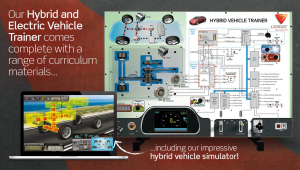Hybrid/Electric Vehicle Technician: Job Outlook
Why is there such an interest in hybrid/electric vehicle training? Electric vehicle adoption in the US has lagged for some time behind other countries due to cost and other barriers. But, as today’s consumers finally embrace hybrid/electric vehicle technology, with the market doubling in value in 2021 alone, demand – and the resulting need for skilled hybrid/electric vehicle technicians – is expected to soar across the nation.
Just the production of the batteries alone, which weigh hundreds of pounds and cost thousands of dollars each, increases the need for skilled technicians. There is a demand for technical scientists, mechanical engineers, electrical engineers, computer engineers, and many other specialized fields in addition to the automotive service requirements. And of course there is an urgency for hybrid/electric maintenance workers, and even a secondary industry of building new charging stations in every city.
The U.S. Bureau of Labor Statistics reported that the annual median salary of all automotive repair technicians, including hybrid/electric technicians, was $46,880 in May 2021. The top 10% earned more than $75,000, with some jobs over $100K.
As the EV market is expected to reach nearly 27 million units in just under 10 years, an exponential expansion in the types of careers in the field is expected, as well as competitive pay and appealing benefits for those entering the field. New workers with the proper training and certification can expect to secure a position with a great deal of upward mobility.
Hybrid/Electric Vehicle Technician: Career Requirements
Hybrid/electric technicians should expect to complete two years at a technical school; earn an associate’s degree in automotive service technology; complete a series of courses in automotive service repair, physics, and electronics; and/or receive manufacturer-specific training to become certified in HEV.
Hybrid/electric technicians will need to be trained on the HEV-specific batteries and components, and will need excellent trouble-shooting and diagnostic skills due to the complex makeup of these vehicles.
Hybrid/electric cars still require maintenance on many of the same components as cars with combustion engines, so technicians will need to be trained on automotive repair skills for universal parts such as steering, brakes, etc.
It will also remain essential that technicians have the ability to work with the public, vehicle manufacturers, and dealers.
Hybrid/Electric Vehicle Training in Your School
If you’re interested in starting an HEV program in your school, or are looking to add individual components to an existing auto lab program, check out our ASE-Aligned Resources for Hybrid & Electric Vehicle Certification.